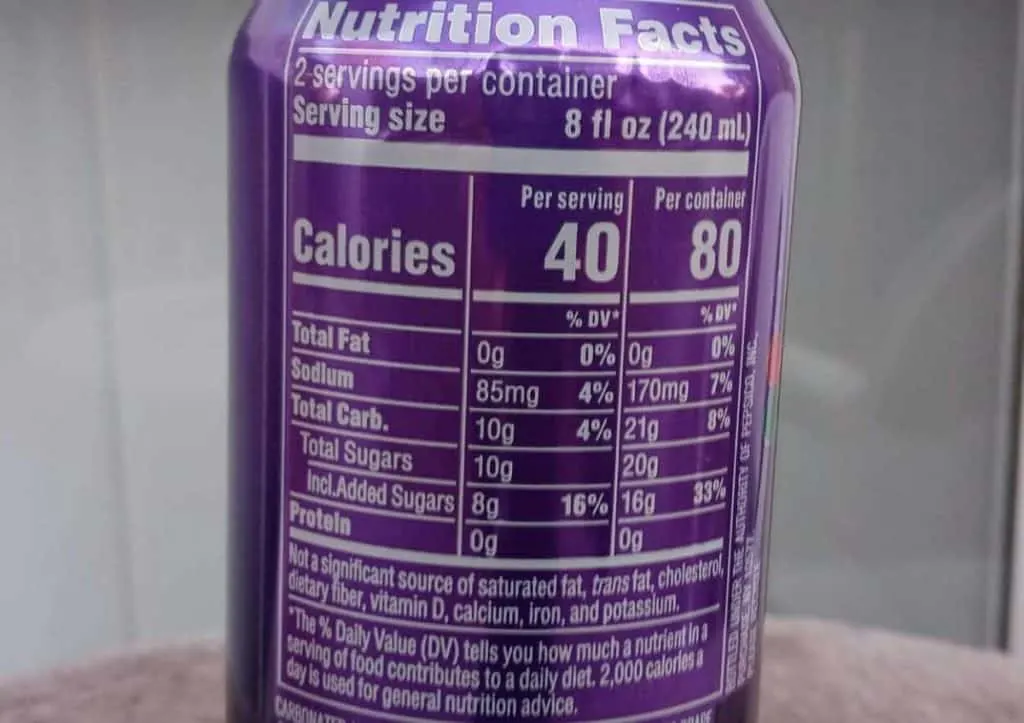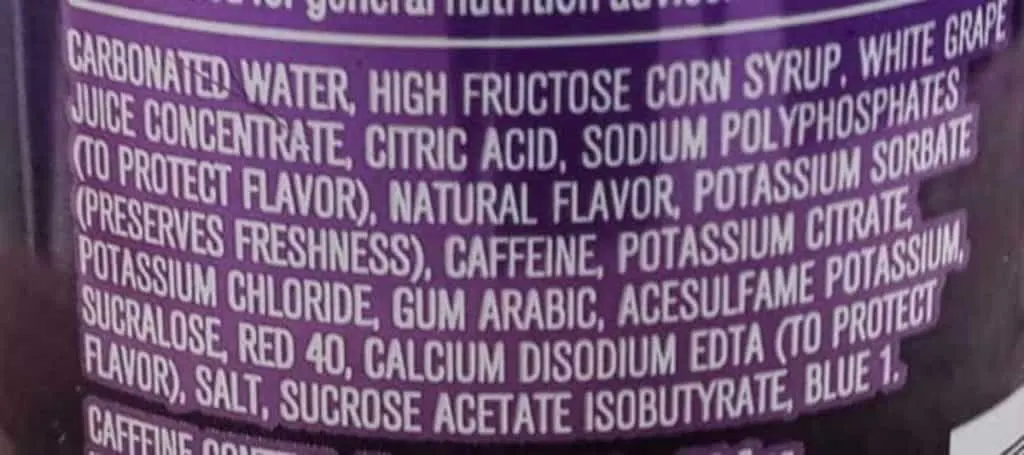From the makers of Game Fuel and regular Mountain Dew comes Mountain Dew Kickstart. It may give you a bit a rush, but should you really be having this drink every day?
Short Answer: I don’t recommend drinking Mountain Dew Kickstart every single day as it contains 20g of sugar, which is quite a large amount for an energy drink.
The AHA guidelines state that the daily sugar limit is 25g of sugar for women and 36g of sugar for men – which means you should only have one can of Mountain Dew Kickstart when you really need an energy boost.
For a more detailed analysis, let’s dive into this article to see what Mountain Dew Kickstart has to offer.
Contents
Is Mountain Dew Kickstart considered an energy drink?
PepsiCo, which introduced the product in 2014, insists that Kickstart is not an energy drink but rather an upgraded soft drink. They think this will appeal to Mountain Dew drinkers who are looking for a healthy morning beverage option and are interested in trying something new.
However, Kickstart’s primary sweetener, fructose, is connected to diabetes, obesity, fatty liver disease, and metabolic disease. So, even if Kickstart isn’t technically an energy drink, it’s still recommended to limit your consumption of them to prevent unpleasant side effects.
Mountain Dew Kickstart Nutritional Facts
First up, let’s have a look at the nutritional values of a regular can of Mountain Dew Kickstart compared with Monster and Red Bull:
| Typical Value | Mountain Dew Kickstart (16 fl.oz) | Monster (16 fl.oz) | Red Bull 8.4 fl.oz) |
| Energy | 80 calories | 210 calories | 110 calories |
| Protein | 0g | 0g | Less than 1g |
| Fat (Of which Saturated) | 0g (0g) | 0g (0g) | 0g (0g) |
| Carbohydrate (Of which Sugars) | 21g (20g) | 54g (54g) | 28g (27g) |
| Sodium | 170mg | 370mg | 105mg |
| Caffeine | 90mg | 160mg | 80mg |
| Vitamin B3 (Niacin) | – | 46mg | 22mg |
| Vitamin B6 | – | 4.6mg | 5.05mg |
| Vitamin B12 | – | 13µg | 5.1µg |
As you can see, Kickstart has the least calories, sugar, and caffeine as compared to leading brands Monster and Redbull.

Mountain Dew Kickstart Ingredients
If you’re wondering what ingredients are there in a 16fl.oz can of Mountain Dew Kickstart, here’s a quick overview:
- Carbonated Water
- High fructose corn syrup
- White grape juice concentrate
- Citric acid
- Sodium polyphosphates (preservative)
- Natural flavor
- Potassium sorbate (preservative)
- Caffeine (90mg)
- Potassium citrate
- Potassium chloride
- Gum Arabic
- Acesulfame potassium (artificial sweetener)
- Sucralose (artificial sweetener)
- Red 40 (coloring)
- Calcium disodium EDTA
- Sucrose acetate isobutyrate
- Salt
- Blue 1 (coloring)

How Much Caffeine Is In Mountain Dew Kickstart?
A 16 fl. oz can of Mountain Dew Kickstart contains just 90mg of caffeine, a relatively moderate amount for an energy drink.
Caffeine is a great ingredient that helps you stay awake and alive throughout a great amount of time.
For comparison, a tall Starbucks order contains about 260mg of caffeine. If you’re a regular caffeine consumer, just one can of Mountain Dew Kickstart might won’t do the trick for you.
However, I personally go for energy drinks with only 50mg – 100mg of caffeine. I find that too much caffeine makes my heart palpitate and gives me a jittery feeling. So, I think Mountain Dew Kickstart’s caffeine amount is just enough.
Depending on your caffeine tolerance and how much you consume daily, caffeine has numerous benefits such as:
- Improvement of your mood
- Suppress appetite for faster weight loss
- Keeps you alert
This is why people are so obsessed with caffeinated drinks. It does have the power to make you feel better by stimulating your mind.
To add on, the FDA recommends a maximum of 400mg of caffeine per day and thankfully, having a can of Kickstart won’t easily make you go over that limit.
But like I said earlier, if you have a higher caffeine tolerance, you may find yourself reaching for multiple cans of Mountain Dew Kickstart in a day. This can lead to side effects such as:
- Anxiety
- Jitters
- Inability to focus
- Gastrointestinal discomfort
- Insomnia
- Irritability
- Heart palpitations
To avoid these unnecessary side effects, it’s best to control your limit.
If you wish to find out more about the effects of caffeine to the heart, check out the video below:
How Much Sugar Is In Mountain Dew Kickstart?
Mountain Dew Kickstart contains 20g of sugar per 16 fl.oz serving. That’s quite a hefty sugar amount in one drink.
There’s no denying that sugar is one of the best brain food, but this only applies to naturally sourced sugar. So this means that added sugar is unhealthy for you because it doesn’t come from unprocessed and natural sources.
You can find added sugar in foods like desserts, sodas, and yes, even energy drinks.
For reference, take a look at what the American Heart Association (AHA) recommends as the daily sugar limit for healthy adults:
| Men | 36g of sugar/150 calories |
| Women | 25g of sugar/100 calories |
As you can see, just one can of Kickstart definitely takes up most of your daily sugar limit, especially if you’re a woman.
That said, sugar does pose negative side effects to your body, and excessively consuming it will lead to adverse side effects such as:
- Weight gain
- Acne
- Cavity
- Diabetes
- Depression
- Kidney disease
- Heart disease
I recommend you to stick to only one can of Mountain Dew Kickstart and only have it when you really need that sugar rush for the sake of your health.
As long as you be extra careful of how much sugar you are consuming throughout the day, you should be fine. But of course, it’s always a good idea to consult your health specialist before adding this sugary energy drink to your diet.
Are There Artificial Sweeteners in Mountain Dew Kickstart?
There are several artificial sweeteners in a Mountain Dew Kickstart, namely, Sucralose and Acesulfame Potassium.
In a nutshell, Sucralose and Acesulfame Potassium are artificial sweeteners commonly used to substitute regular sugar as they contain zero calories.
To turn sugar into sucralose, it goes through a chemical process that tweaks the chemical structure of sugar to make it almost 600 times sweeter than sugar.
That said, Acesulfame Potassium’s often blended with other sweeteners such as sucralose (Splenda) and aspartame (Equal) due to its slightly bitter after-taste. It can be found in most sodas, shakes, drink mixes, frozen desserts, and baked goods.
While these artificial sweeteners won’t make you feel guilty about consuming sugar due to their calorie-free nature, there’s still a lot that we don’t know about them and their long-term effects.
Moreover, a study shows that overconsumption of acesulfame potassium may lead to problems in cognitive function.
Also, there’s High Fructose Corn Syrup (HFCS) in a can of Mountain Dew Kickstart. So that’s regular sugar plus three types of sweetener all in a 16 fl.oz can, which I find to be an unnecessary and unhealthy combination.
The only logical explanation for this is that this is an attempt to increase the sweetness of the drink without affecting much of your calorific intake.
While the use of artificial sweeteners in our foods and drinks is FDA approved, you should still consume them in moderation to avoid triggering adverse effects, especially if you’re sensitive to them.
How Long Does Mountain Dew Kickstart Take To Work?
After consumption, it could take about 15 minutes to 2 hours before the caffeine in Mountain Dew Kickstart reaches a peak in your blood. It also depends on how your good body responds to caffeine, but most people need a 45-minute time frame before they feel energized and alert.
It’s a given that caffeine is the main ingredient in energy drinks as it helps stimulate your heart rate and blood pressure, which builds up the energy boost.
Typically, it takes about 45 minutes after your consumption to experience a maximum energy boost, as this is when the caffeine peaks in your bloodstream.
That said, if you’re planning to use Mountain Dew Kickstart as a pre-workout energy drink, I recommend having it at least 30 minutes before your workout. This will surely enhance your workout performance.

However, Mountain Dew Kickstart’s high sugar content will most likely make you experience a sugar crash. It will leave you feeling tired and lethargic due to the sudden drop in your blood levels.
It’s also important to keep in mind that caffeine has a half-life of around 5 – 6 hours, so it’ll take that long for just 50% of it to leave your system. On average, it takes about 12 hours for your body to get rid of the caffeine fully.
For a clearer picture, if you drink one can of Mountain Dew Kickstart with 90mg of caffeine, there will still be around 45mg of caffeine left in your system after 5 hours.
That said, caffeine can reduce your sleeping time by one hour, so I highly suggest you avoid drinking Mountain Dew Kickstart, or any other caffeinated beverage, within 6 hours before bedtime.
Are There Any Health Risks Of Drinking Mountain Dew Kickstart?
Like other energy drinks, excessively drinking Mountain Dew Kickstart can be harmful to your health, especially if you lead a more sedentary lifestyle.
There’s no denying that Mountain Dew Kickstart is a great energy drink to help increase your alertness and improve your overall mental concentration and mood.
I find its caffeine content to be a reasonable amount which even those who aren’t regular caffeine drinkers can tolerate. Provided you don’t go overboard as this will lead to caffeine dependence, and it’ll be hard for you to cut back.
That said, it’s also just as easy to tip over the daily recommended limit if you don’t be mindful of your intake. The main contributor to this is the high sugar amount this drink contains.
This is why you should always be mindful of your Moutain Dew Kickstart intake and ensure you follow a regular exercise schedule to burn off the calories and sugar.
However, if you have any pre-existing health conditions like diabetes, I highly suggest avoiding this sugary energy drink.
Is Drinking Mountain Dew Kickstart Every Day Safe?
In my opinion, drinking Mountain Dew Kickstart every day isn’t safe as it contains a high amount of sugar and calorie, which can lead to serious health problems.
As someone who’s sensitive to caffeine, I like that Mountain Dew Kickstart has a modest caffeine content as it won’t leave me with any major side effects afterwards.
The only downside of this energy drink is that it contains an unhealthy amount of sugar. Even drinking one can of Mountain Dew Kickstart will make you go over the recommended daily sugar limit.
It’s important to note that sugar also comes from other foods that we regularly consume. So you may want to think twice before reaching out for a can of Mountain Dew Kickstart every single day.
While the effects may not be immediate, I still don’t recommend drinking it every day as it can lead to possible long-term health problems such as diabetes, high blood pressure or even heart disease.
Thus, it’s best to control yourself to drink Mountain Dew Kickstart only when you really need it and stick to just one can. If you insist on including this energy drink into your regular diet, I suggest spacing out your consumption and have around 2 – 3 cans in a week.
Is Mountain Dew discontinuing Kickstart?
You can still buy MTN DEW Kickstart in stores and online. However, there was a product listing from PepsiCo found in 2022 that indicated the possible discontinuation of both Kickstart (Energizing Grape) and Kickstart (Energizing Fruit Punch) after current supplies ran out. Unfortunately, the cause of this anomaly is uncertain. Still, there are now three Kickstart flavors available in the United States: Orange Citrus, Black Cherry, and Pineapple Orange Mango.
Mountain Dew Kickstart Flavors
If you’re craving something fruity, Mountain Dew Kickstart might be the perfect energy drink for you. I personally recommend their Midnight Grape flavour.
Other Mountain Dew Kickstart flavours you can try out are:
- Orange Citrus
- Black Cherry
- Fruit Punch
- Pineapple Orange and Mango
If you’re interested for an in-depth review of each flavours, check out the video below:
Final Thoughts
In my honest opinion, you shouldn’t drink Mountain Dew Kickstart every single day to avoid possible long-term health problems due to its high sugar content.
Indeed, it makes a good source for an energy booster but only if it’s taken in moderation. I think having Mountain Dew Kickstart excessively is just asking for trouble.
Thus to avoid damaging your health, it’s a good idea to alternate your energy drink consumptions with low sugar caffeinated beverages such as regular coffee or green tea.
If you’re curious to find out if Mountain Dew Kickstart actually works as advertised, feel free to head on over to my article on Does Mountain Dew Kickstart Actually Works.
